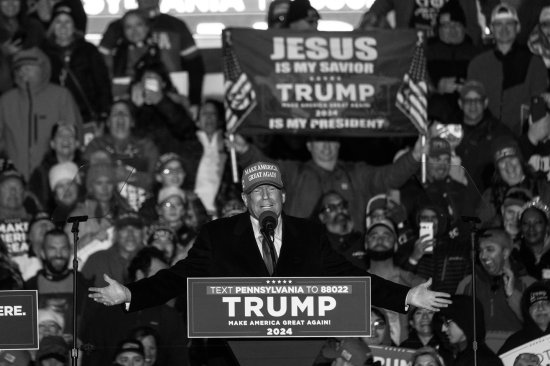
"I think there is a definite anti-white feeling in this country and that can’t be allowed either," Trump tells TIME.
Read our full cover story on Donald Trump here. You can also read the transcript of the interviews here and a full fact check here.
If elected to a second term in the White House, Donald Trump intends to pursue policies that would address what he says is a “definite anti-white feeling” in America.
“If you look at the Biden Administration, they’re sort of against anybody depending on certain views,” Trump tells TIME in an interview when asked about his supporters who believe anti-white racism now represents a greater problem than anti-Black racism. “They’re against Catholics. They’re against a lot of different people… I think there is a definite anti-white feeling in this country and that can’t be allowed either.”
[time-brightcove not-tgx=”true”]Read More: Donald Trump Says Political Violence ‘Depends’ on ‘Fairness’ of 2024 Election
“I don’t think it would be a very tough thing to address, frankly,” Trump says. “But I think the laws are very unfair right now. And education is being very unfair, and it’s being stifled. But I don’t think it’s going to be a big problem at all. But if you look right now, there’s absolutely a bias against white [people] and that’s a problem.”
For TIME’s latest cover story, Trump sat down for more than an hour with TIME national politics reporter Eric Cortellessa on April 12 at his Mar-a-Lago club in Palm Beach to discuss his vision for a second term. They spoke again by phone on April 27.
In Trump’s first term, his Justice Department investigated universities over affirmative action admissions policies they believed could discriminate against white applicants. Last year, the Supreme Court banned race-based affirmative action from college admissions.
Read More: Trump Hits Netanyahu on Oct. 7; Says Other Israeli Leaders ‘Could Do a Good Job’
In a second term, Trump has vowed to levy taxes and fines against schools he sees as “too woke.” He has also signaled support for dozens of bills targeting diversity, equity, and inclusion (DEI) policies in higher education that have been filed in statehouses across the country. Trump and large parts of the Republican base have also attacked critical race theory (CRT), an academic framework that explores how aspects of society perpetuate systemic racism, and worked to erase such coursework from curricula around the country.
Polling data conducted by YouGov in December found that Republicans were more likely to say that white people faced a “great deal” of discrimination compared to Black or Arab Americans. Republicans were also more likely, according to the poll, to say that hate crimes against white people were a very serious problem than they were to say the same of Black or Arab Americans.
Anti-Black hate crime was the most common category in the FBI register of reported hate crime in 2022; it was more than three times more common than anti-white hate crime.
Read More: Donald Trump Calls for Evan Gershkovich’s Release
Trump has repeatedly claimed to be a target of anti-white discrimination. At rallies and on social media, he regularly labels Black prosecutors investigating him as “racist” and has called the Black Lives Matter movement a “symbol of hate.”